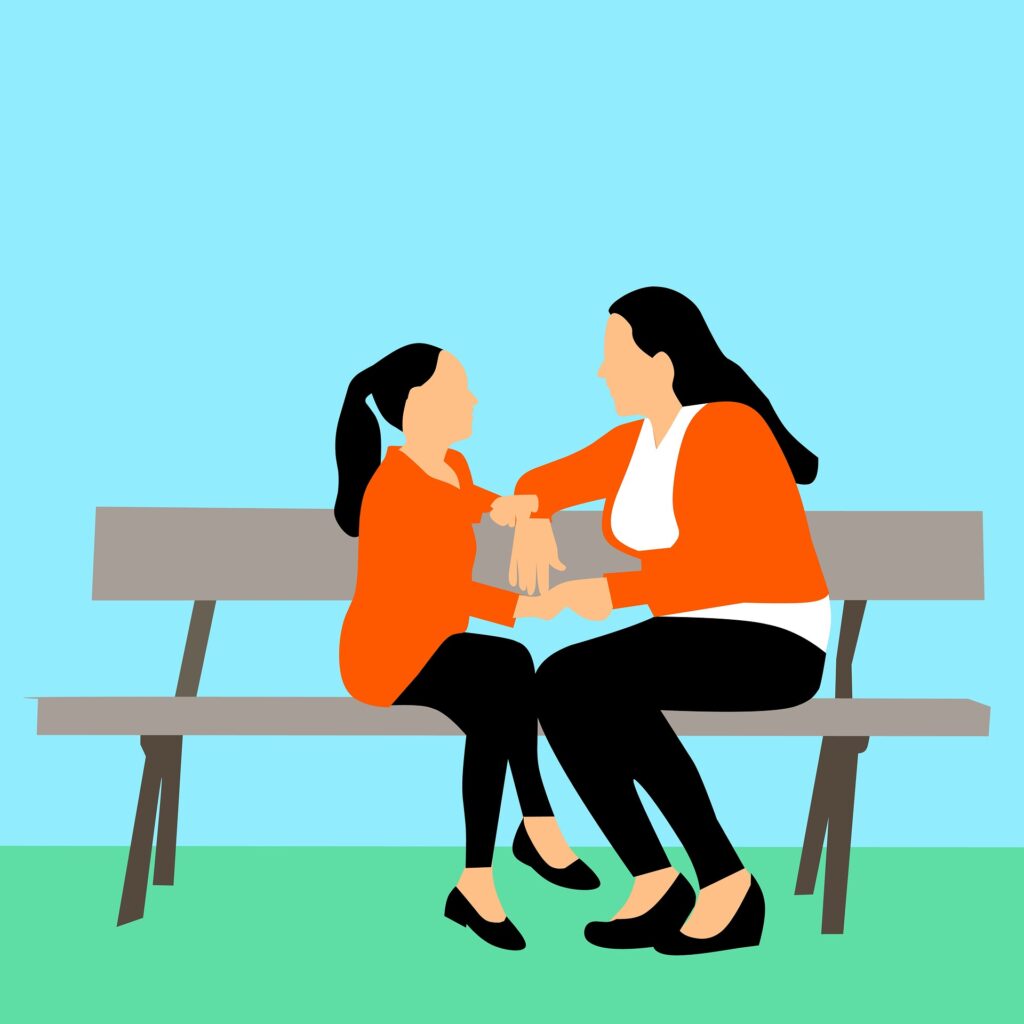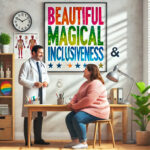I’m a psychiatrist and my daughter has anorexia

I’m a psychiatrist and my daughter has anorexia
I saw anorexia nervosa (AN) coming. It did not strike me suddenly. I had developed AN as a girl, and the thing I feared most about becoming a mother was that it could return in my life, harming one of my children.
So, when my daughter Arianna (Ary) started to fixate about weight, to restrict food, I started to be chased by fear, which in the next months – as she became weak, closed up, sleepy, cold, and detached from all the things that gave her joy before – turned into angst and impotence. I felt impotence and anger against myself and her, against my husband, and the whole world.
I am a psychiatrist. Many psychiatrists choose this profession to alleviate in others the suffering they have experienced on themselves. They kind of know what it feels like. Yet I was unable to protect my own child from AN. What kind of mother was I?
I saw it coming as I said…yet I couldn’t avoid the impact, so it exploded and swept away my girl’s serenity and my family’s peace.
I awoke every night with nightmares of her getting up in the dark and jumping out of the window. As a child with AN I used to hate that my mother would come in the night to check my breath: now I was catching myself doing exactly the same things, maybe with more anguish, and more guilt.
I was a mother feeling deep shame
By the time I encountered F.E.A.S.T. and Dr Richard Kreipe* I was feeling devastated. I was a wrong mother. I was a mother feeling deep shame that an awesome girl like Arianna had the misfortune to come from me. I didn’t deserve her. Nothing good would come out of me to her. Maybe I should put a distance between us, to stop my bad influence on her: I gave her AN. How could I wait and keep on making her life more wrong with my presence?
Those were my thoughts while everybody was asleep and the silence fostered my fears.
Only by chance did I come across a blog on The Diary Healer and left a comment, one night. So, when June Alexander replied I was really surprised. I was impressed by the gentle touch of her words and by her keenness to share with me her story and to help.
I began to journey away from guilt and towards awareness
A journey away from the sense of guilt and toward awareness started. And little by little, as guilt faded away, I developed a new capacity for standing by Ary and for “seeing” her. I learnt how to gradually develop patience and ability to tell my daughter and AN apart.
I started to see things as they were: AN is a pathology, a bully enemy to fight, but it is not my child. I had to team up with Ary against the AN monster, to not let it tighten up its clutches around her.
I started to look for the tiniest glimpses of my child’s previous vitality. I learnt little by little how to validate, reinforce and witness all the efforts of my child. “Catch Arianna doing something very good and tell her”, were Dr Kreipe’s words….
Sometimes discouragement came along again. Most of all, Ary’s bursts of rage at lunchtime gave me awful feelings. I was scared that the evil strength of AN would eventually take her. It was then that I most needed help and understanding. June’s words as someone who has recovered from the illness, and the advice and encouragement of Judy Krasna and other parents in the F.E.A.S.T. program helped greatly in those moments.
Dr Kreipe’s gentle and wise presence across the miles (United States to Italy)) saved my life. And, most importantly, saved Arianna’s.
‘I want to get well, Mom and Dad’
One day Ary came home from school as usual for lunch. At that time, I had managed to get permission to come home from work to prepare meals for the family, so on this day Ary, my second child Diletta, my husband Giampiero and I were gathered around the table. Ary gave us a shy smile and an intense look, and announced she had something important to say:
“I want to get well, Mom and Dad. I want to feel better and do something ‘normal’ for my age. I want to see Francesca (her best friend) again, spend time with her, and go on holiday this summer. Please, help me.”
Today Arianna is feeling better. She has resumed eating. Most importantly, she has returned to her teenage life of friends, dreams, songs, and projects for the future. I don’t know if her illness is completely over. I wish so from the bottom of my heart. But what I certainly know is that it was not guilt, self-reproach and blaming that has helped her to regain her healthy self. It was love, gentleness, closeness, experience sharing, and good advice, which came to us on a very fortunate day.
A message from June
Rosangela emailed me late one evening in Australia in 2020. She was reaching out from her home in Italy, having read a blog post by Dr Kreipe on my site, The Diary Healer. I responded to Rosangela and wrote to Dr Kreipe in the United States. So began an amazing communication across three continents, to assist a mother who was struggling with her daughter’s AN.
I also introduced Rosangela to Judy Krasna (executive director of F.E.A.S.T.) in Israel. Rosangela proceeded to take part in a F.E.A.S.T. 30-day empowerment program for families which she found very helpful and she continues to be involved with this wonderful, global family support organisation.
Through reaching out, Rosangela has found peace. She writes: “Your encouraging words and teaching, Dr Kreipe’s incredible wisdom and generosity, the F.E.A.S.T. parents’ stories, and the love that all of you have shared with me, have made me stronger and braver…. Sometimes I have found myself in despair and tiredness. But there have always been words from you, from Judy and from Dr Kreipe, to sustain my morale and to keep me going on.”
A message from Dr Kreipe
In responding to Rosangela’s message here, I want to focus on what I have learned from parents—especially mothers—of children—especially daughters—who have restrictive anorexia nervosa (RAN) themselves and who are also in a “helping health profession”.
I have had mothers who are primary care providers, surgeons, psychiatrists, psychologists, social workers, dietitians, nurses and therapists of various kinds who feel the dual emotional pain and agony (in the United States we call this kind of two-hit situation a “double whammy”) because they:
1) had RAN when they were an adolescent or young adult—even though fully recovered—and feel that they somehow “gave it” (like an unwanted gift) or “transmitted it” (like an unwanted infection), and
2) they are in a helping profession, but are unable to make help their child get better.
So, they feel self-imposed blame (and sometimes are externally-provided blame by husbands, mothers-in-law, and so on—that’s a third “whammy”) for having had RAN themselves AND an overwhelming sense of inadequacy because they can’t be a healing professional that they may have studied years and worked tirelessly to become.
I remind these parents of the wisdom of professionals being able to separate their professional roles from their personal roles. And, as important as being a physician or psychiatrist or nurse might be, being a parent is always the more important role when it comes to the life of one’s child. So, Rosangela, you have the added burden of not only being a physician (MD), but also a researcher (PhD) who studies mental health issues in cancer patients! And my sense is that in addition to blaming yourself, you don’t get quite as much help from others in your family, or if you do, you still blame yourself for everything that’s been wrong with Arianna, while taking NO credit for having been a wonderful mother who has provided her with half of her amazing genes. Such a path was a recipe for disaster, but you chose to not stay on that path, and began to follow a different route.
I remember one dad, a prominent lawyer, whose 13-year-old daughter developed severe RAN, requiring admission to the hospital for weight restoration. That was back in the day when we developed “behavioural contracts” with various incentives and rewards. His daughter was very resistant to treatment in the hospital. His wife was in total support of everything that we did, both as an outpatient and then as an inpatient. The dad, on the other hand, was easily manipulated by his daughter, and not involved in any significant way with her outpatient treatment. In fact, the girl’s mother helped us start the Rochester Eating Disorder Network back in February 1990—which is still going strong meeting weekly on Zoom since March 2020. The dad never attended these meetings, too busy being a lawyer…
So, when the girl resisted our inpatient treatment protocol and wanted to “negotiate the contract”, who did she call in as her counsel? Her father. He would come into the hospital and meet with me, as the attending physician, and try to say that what I was expecting was unreasonable and that he was worried about how the treatment was threatening his daughter’s mental health—already very anxious and depressed. Basically, I was the problem and he was there to represent his “client” (his daughter) to try to get a “better deal”. Classic triangulation that Dr Salvador Minuchin talked about: patient gets dad on her side (alongside her RAN) and at the other end of the triangle is her mother, and at the third corner of the triangle is me.
I finally said to the father, “I understand that you are very concerned about your daughter and you want what’s best for her. The problem is that she wants to keep her eating disorder and that can potentially kill her. Her mother is at the other extreme, having supported everything that what we propose to help your daughter get better—based on scientific and historical evidence over the past 20 years that our approach works. Right now, you are acting as your daughter’s lawyer, trying to argue her case for less caloric intake than she should be taking in every day. What she needs is not a lawyer arguing for different treatment, but a father who stands alongside her mother in a unified stance for treatment.”
The father removed his daughter from the hospital a few days later. She now is in her 40s and still has anorexia nervosa.
- Dr Richard Kreipe is a Pediatrician and Adolescent Medicine Specialist who founded the Child and Adolescent Eating Program at the University of Rochester Medical Center in the Department of Pediatrics in 1984 and the inaugural Medical Director of the Western New York Comprehensive Care Center for Eating Disorders in 2005.






Ciao Rosangela,
Thank you for your moving account. I’m so glad that you found help–and from all over the world! I have attaching a parent/patient handout that I think may be helpful, it is in Italian as well as English on my website adaptedtofamine.com. It provides an evolutionary explanation for the odd symptoms that helps people to fight them. In 2019 I worked with the Anorexia Center in Todi in Umbria. I continue to work with Simonetta Marucci, an endocrinologist from there. I’d love to talk with you and perhaps we could do a zoom with Simonetta too, if you are interested. Warm regards, Shan Guisinger